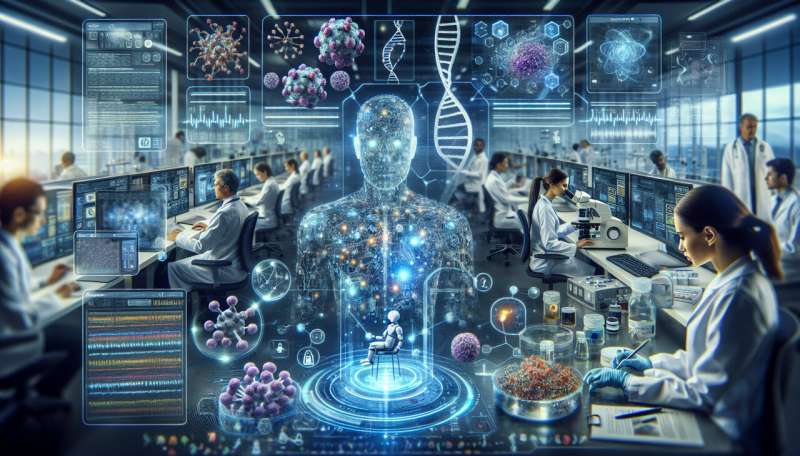This article has been reviewed according to Science X's editorial process and policies. Editors have highlighted the following attributes while ensuring the content's credibility:
fact-checked
trusted source
proofread
Exploring the role of artificial intelligence in early cancer detection

Two new review articles in AI in Precision Oncology explore the role of artificial intelligence (AI) in early cancer detection. A primer provides an overview of AI, and the second review examines the promising clinical applications of AI in early cancer detection.
In the primer, Nikhil Thaker, MD, Medical Director and Chair of Radiation Oncology, Capital Health, and Co-Founder, Chief Medical Officer at Bayta Systems, and co-authors describe the relevance, methodologies, and applications of AI. AI applications span various oncology data types, including electronic health records, medical imaging (radiology and digital pathology), biomarkers (genomics, proteomics, metabolomics), and digital health sensors.
Leveraging AI in oncology enhances diagnostic accuracy, improves treatment selection, and enables early detection through innovative approaches like wearable devices and mobile health applications.
In the review titled "The Role of Artificial Intelligence in Early Cancer Detection: Exploring Early Clinical Applications," Nikhil Thaker, MD, and co-authors state, "AI's integration in early cancer diagnosis signifies a paradigm shift in health care, offering transformative potential in analyzing complex data from diverse modalities. This technology, however, should complement, not replace, medical expertise. Successfully integrating AI into medicine requires a robust, multi-disciplinary approach."
"This manuscript underscores the necessity for our journal, offering a comprehensive analysis of large language models' prime applications, especially in improving cancer screening and early detection. It highlights the transformative potential of AI in health care, urging a shift towards better standards. The authors articulate a clear vision for progress, inviting readers to explore the substantial benefits of AI-enabled health care advancements," says Douglas Flora, MD, Editor-in-Chief of AI in Precision Oncology.
More information: Nikhil G. Thaker et al, The Role of Artificial Intelligence in Early Cancer Detection: A Primer on Artificial Intelligence, AI in Precision Oncology (2024). DOI: 10.1089/aipo.2024.0003
Nikhil G. Thaker et al, The Role of Artificial Intelligence in Early Cancer Detection: Exploring Early Clinical Applications, AI in Precision Oncology (2024). DOI: 10.1089/aipo.2023.0011



















